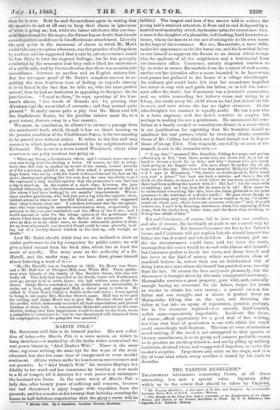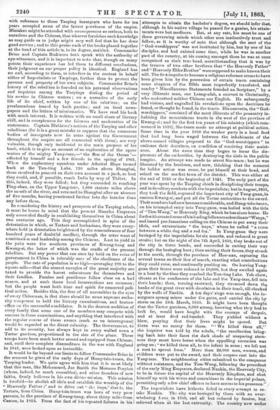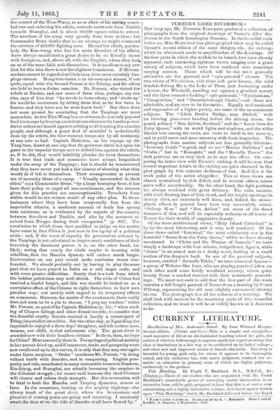THE TAEPING REBELLION.* TRUSTWORTHY information concerning China, at all times
interesting, has now a special value. Opinions differ widely as to the course that should be taken by England,
* Th! Taeging Rebellion : a Narrative of its Rise and Progress. By Commander Lyndsay Brine, R.N., F.R.G.S. London : • Five Months on the Yang-Tsze. with a Narrative of the Exploration of is Upper Waters, and Notices of the Present Rebellions in China. By T. W. Waltham; late Captain, R.A. London : Murray. with reference to those Taeping insurgents who have for ten years occupied some of the fairest provinces of the empire. Mistakes might be attended with consequences so serious, both to ourselves and the Chinese, that whoever furnishes such knowledge as may guide us to judge aright may well feel that he has done good service ; and to this praise each of the books placed together at the head of this article is, in its degree, entitled. Commander Brine and Captain Blakiston both speak with the authority of eye-witnesses, and it is important to note that, though on many points their experience has led them to different conclusions, their judgment on our proper policy is identical. England has no call, according to them, to interfere in the contest in behalf either of Imperialists or Taepings, further than to protect the persons and property of her own subjects. Commander Brine's history of the rebellion is founded on his personal observations and inquiries among the Taepings during the period of his service in Chinese waters ; on a narrative of the early life of its chief, written by one of his relatives; on the proclamations issued by both parties ; and on local news- papers and the letters of missionaries. We have read his book with much interest. It is written with no small share of literary skill, and is conspicuous for the fairness and moderation of its statements. Captain Blakiston's notices of the Taeping and other rebellions (for it is a great mistake to suppose that the numerous bodies of insurgents now in arms against the Government throughout the empire are all connected with them), are very valuable, though only incidental to the main purpose of his book, which is to give an account of an exploration of the upper waters of the mighty Yang-tsze,—" the Son of the Ocean"— effected by himself and a few friends in the spring of 1801. When the exploratory squadron under Admiral Hope turned back at the Tun-ting Lake, 750 miles above Shanghai, these resolved to proceed on their own account in a junk, as best they could, and, if possible, reach India by way of Thibet. In this, indeed, they were foiled; but they succeeded in reaching Ping-shan, on the Upper Yang-tsze, 1,800 statute miles above the mouth of the river, and returned to Shanghai after an absence of five months, having penetrated further into the interior than any before them.
In considering the history and prospects of the Taeping rebels, it must be borne in mind that the present Manchu Emperors only succeeded finally in establishing themselves in China about two centuries ago. This they accomplished in spite of the detestation in which, as Tartars and barbarians, they were every- where held (a detestation heightened by the remembrance of four hundred years of doubtful conflict), through the utter want of combination and leadership among the Chinese. Last to yield to the yoke were the southern provinces of Kwang-tung and Kwang-si, the latter of which was the cradle of the present rebellion. But any power that can once lay hold on the reins of government in China is tolerably sure of the obedience of the people. The rate of population is so high—averaging 288 to the square mile—that the utmost energies of the great majority are taxed to provide the barest subsistence for themselves and their families. Famine and pestilence follow close on a bad season, and at such times local insurrections are common ; but the people want both time and spirit for concerted poli- tical action. Besides this, the first of all necessities in the eyes of every Chinaman, is that there should be some supreme autho- rity competent to hold the literary examinations, and bestow office on the successful candidates. It is the dearest ambition of every family that some one of its members may compete with success in these examinations, and anything that interfered with the regular course of these events (such as an interregnum) would be regarded as the direst calamity. The Government, to add to its security, has always kept in every walled town a Tartar garrison, proportioned to the size of the place. These troops have been much better armed and equipped than Chinese, and, until their complete discomfiture in the war with England in 1841, wore looked upon as invincible.
It would be far beyond our limits to follow Commander Brine in the account he gives of the early days of Hung-tsin-tsuen, the Taeping leader. We quite agree with him that it is most likely that this man, like Mohammed, Joe Smith the Mormon Prophet (whom, indeed, he much resembles), and other founders of new faiths, firmly believes in his own divine mission. This mission is twofold—to abolish all idols and establish the worship of the 4. Heavenly Father ;" and to drive out the imps," that is, the Tartars, from China. Hung-tsin-tsuen was born of very poor parents, in the province of Kwang-tung, about thirty miles from Canton, in 1813. From the fact of his repeated failures in his attempts to obtain the bachelor's degree, we should infer that, although in his native village he passed for a genius, his attain- ments were but mediocre. But, at any rate, his must be one of those governing minds which other men instinctively trust and follow, as it is worthy of note that although the sect of the "God-worshippers" was not instituted by him, but by one of his disciples, and had existed some time, while he was in another part of the country, at his coming amongst them he was at once recognized as their true head, notwithstanding that it was by the trances of two other brethren that "the Heavenly Father" and "Heavenly Elder Brother" were supposed to make known their will. The first impulse to become a religious reformer seems to have been given him by the possession of certain tracts containing some chapters of the Bible most imperfectly translated, and sundry"Miscellaneous Statements founded on Scripture," by a very illiterate man, one Leang-afah, a convert to Christianity, who understood neither Chinese nor English. He subsequently had visions, and engrafted his revelations upon the doctrines he found, or thought he found, in the tracts. His converts, the "God- worshippers," consisted of the most illiterate of the peasantry in- habiting the mountainous tracts in the west of the province of Kwang-si ; and for the first ten years of his ministry (which com- menced in 1839), Sin-tsuen made no attempt at political action. Some time in the year 1850 the weaker party in a local feud that bad long been waged between the inhabitants of the above-named villages proposed to the " God-worshippers " to embrace their doctrines, on condition of receiving their assist- ance. About the same time they began to incur the dis- pleasure of the authorities, by destroying the idols in the public temples. An attempt was made to arrest Sin-tsuen ; but he was liberated by the brethren, and now, thinking that the moment for, bolder action was come, he put himself at their head, and seized on the market town of the district. This was either at the end of 1850 or the beginning of 1851. The early part of the year was spent by the Taeping chiefs in disciplining their troops, and in desultory combats with the imperialists; but in Angus 0851, they took the field, captured the important city of Yung-gnan, in eastern Kwang-si, and put all the Tartar authorities to the sword. Their numbers had now become considerable, and Hung-tsin-tsuen, on his triumphal entry into Yung-gnan, was hailed with the title of "Tien-Wang," or Heavenly King, which he has since borne.- He forthwith created some of his leading followers subordinate " Wangs," and issued proclamations calling on the Chinese to put away their idols, and exterminate " the imps," whom he called "a cross between a white dog and a red fox." In Yung-gnan they were besieged by the imperialists for six mouths, and reduced to great straits; but on the night of the 7th April, 1852, they broke out of the city in three bands, and succeeded in cutting their way through the besieging host ; then uniting their forces, they struck to the north, through the province of Hoo-nan, capturing the several towns on their line of march, exacting what contributions they could raise, and continually pushing on. On leaving Yung- gnan their forces were reduced to 10,000, but they swelled again to a host by the time they reached the Tun-ting Lake. Yoh-chow, situate at the confluence of the lake and the Yang-tsze, fell into their hands ; then, turning eastward, they streamed down tle. banks of the great river with desolation in their track, till checked by the walls of Nankin. A ten days' siege was enough, the in- surgents sprang mines under the gates, and carried the city by storm on the 10th March, 1853. It might have been thought that the Tartar garrison, 8,000 strong, knowing what they had to look for, would have fought with the courage of despair,
and at least died red-handed. They yielded without a blow, praying that their lives might be spared. But there was no mercy for them. "'We killed them all," the inquirer was told -by the rebels, "the recollection bring- ing back into their faces the dark shade of unsparing stern- ness they must have borne when the appalling execution was going on; we killed them all, to the infant in arms ; we left not a root to sprout from.' More than 20,000 men, women, and children were put to the sword, and their corpses cast into the Yang-tsze. The neighbouring cities submitted to the conqueror without resistance, and the Tien-Wang, following the precedent of the early Ming Emperors, declared Nankin, the Heavenly City, to be in future the capital of the Heavenly Kingdom, and shut himself up with his wives and concubines in the imperial palace, permitting only a few chief officers to have access to his presence."
The imperialists have hitherto failed in every attempt to re- take Nankin. The city was besieged by them with an over- whelming ferce. in 1859, and all but reduced by famine, but relieved when at the last extremity. The country now under the control of the Tien-Wang, so as to allow of his raising contri- butions and enforcing his edicts, extends eastwards from Nankin towards Shanghai, and is about 30,000 square miles in extent The numbers of his army vary greatly from time to time ; but Commander Brine thinks that on an average he might command the services of 400,000 fighting men. He and his chiefs, particu- larly the Kan-waug, who has the main direction of his affairs, have always manifested a great desire to be on friendly terms with foreigners, and, above all, with the English, whom they look on as of the same faith with themselves. It is needless to say now that for this idea there is not the slightest foundation. If Moham- medans cannot be regarded as Christians, then most certainly Tae- pings cannot. Hung-tsin-tsuen is in his own eyes almost, if not quite, equal with the Second Person in the Trinity, and his edicts are held to have a divine sanction. Mr. Forrest, who visited the rebels at Nankin, and saw more of them than, perhaps, any one else, says of him that "he revels in heterodoxy, and shuts up' his would-be converters by telling them that, as he hos been in heaven and they have not, he must know best." But there does not seem ground for concluding that the Taepings are mere marauders. As the Tien-Wang has no revenue,he can only pay and feed his troops by levying contributions wherever he has the power. Strict orders are issued against robbing or ill-treating the country people, and although a great deal of mischief is undoubtedly done by the rebels, the Government troops are by all testimony at any rate as bad. Captain Blakiston, on his voyage up the Yang-tsze, found at one city that the governor dared not open his gates to the imperial troops sent to defend him against the rebels, as, if he did, they would infallibly plunder the town themselves. It is true that trade and commerce have always languished under the sway of the Taepings ; but it should be remembered . that they have never yet had a fair chance of showing what they would do if left to themselves. Their arrangements at present are of necessity those of a camp. "Usually surrounded in their cities," says Commander Brine, "by a large besieging force, it has been their policy to expel all non-combatants, and the reasons given for this practice are unexceptionable. Treachery from within would be the certain result of any other plan. In those instances where they have been temporarily free from the imperialist attacks, a moderate amount of trade has sprung into existence, as is evidenced by the reports of the country between Soo-chow and Nankin, and also by the accounts re- ceived from Ningpo during their occupation" (p. 357). The conclusion to which those best qualified to judge on the matter have come is, that China is just now in the agony of a political crisis ; and, if the want of capacity for government evinced by the Taepings is not calculated to inspire much confidence of their becoming the dominant power, it is, on the other hand, un- likely, seeing that nearly the whole empire is teeming with rebellion, that the Manchu dynasty will endure much longer. Intervention on our part would make confusion worse con- founded. We should probably end by having to play the same part that we have played in India on a still larger scale, and with even greater difficulties. Surely that is a task from which the boldest politicians may well shrink. The evils of China had reached a fearful height, and this war should be looked on as a convulsive effort, of the Chinese to right themselves in their own peculiar way ; not merely with regard to its temporary effects on commerce. Between the merits of the combatants there really does not seem to be a pin to choose, "I pray my readers," writes Mr. Forrest, as quoted by Captain Blakiston (p. 55), "when read- ing of Chapoo fallings and other dismal records, to consider that the dreadful cruelty therein enacted is hardly a counterpart of Tsing (imperialist) atrocities. But the other day, at Ngan-king, the imperialists enjoyed a three days' slaughter, and left neither man, woman, nor child, in that unforunate city. The great river is crowded now with their headless victims." Is there, then, no hope for China? Most assuredly there is. The springs of political activity in her are.not dried up, and if commerce, trade, and prosperity seem now swallowed up in this vortex, it is only that they may rise again under fairer auspices. " Order " continues Mr. Forrest, "is doing valiant battle with disorder, and is conquering. English pros- perity and rule, manifested in many mercantile houses in Hankow, Kiu-kiang, and Shanghai, are silently becoming the umpires in the Celestial struggle ; for round such beacons the tired Chinese will cluster and reform their strength. But this restoration will be fatal to both the Manchu and Taeping dynasties, sooner or later. In the meantime, looking on the mighty highway—the silvery track of the great river, where the forerunners and pioneers of coming peace are going and returning, I anxiously await the time when the tide of disorder shall have flowed by."





































 Previous page
Previous page